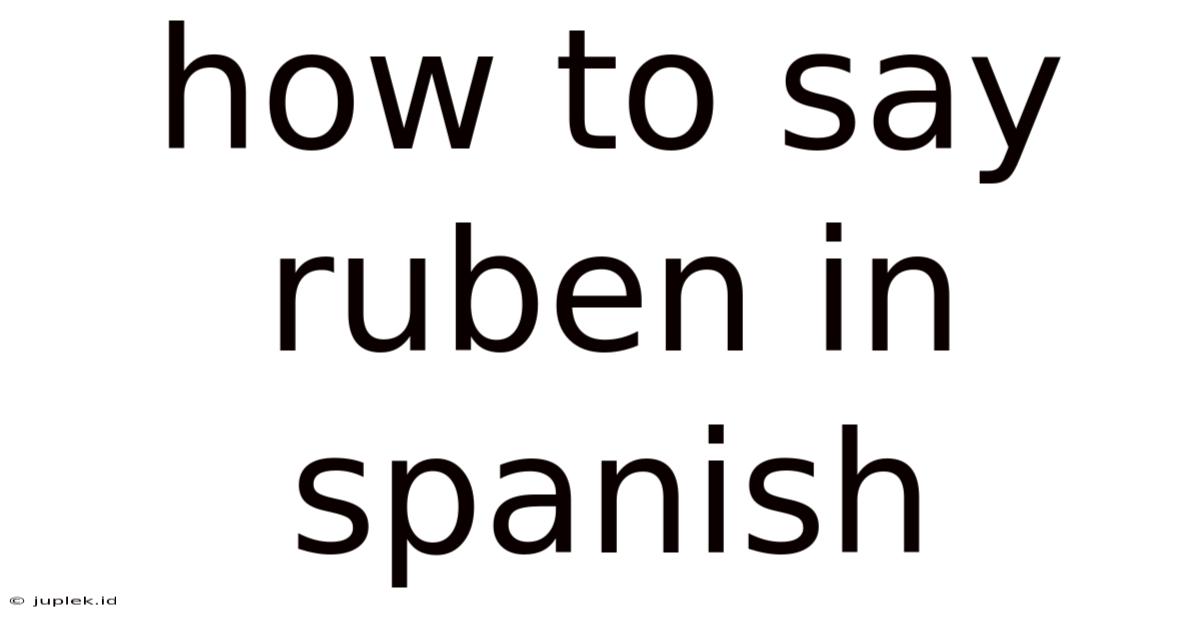How To Say Ruben In Spanish

Discover more detailed and exciting information on our website. Click the link below to start your adventure: Visit Best Website meltwatermedia.ca. Don't miss out!
Table of Contents
How to Say "Ruben" in Spanish: More Than Just a Name
The seemingly simple question, "How to say Ruben in Spanish?" opens a fascinating window into the complexities of language, cultural nuances, and the evolution of names across different linguistic landscapes. While the most straightforward answer is simply "Rubén," a deeper dive reveals a rich tapestry of variations, spellings, and associated cultural contexts. This article will explore these facets, offering a comprehensive guide beyond the basic translation.
The Standard Translation: Rubén
The most common and accepted way to say "Ruben" in Spanish is Rubén. This spelling accurately reflects the pronunciation in most Spanish-speaking regions. The accent mark over the "e" is crucial; it indicates that the "e" is stressed, distinguishing it from "Ruben" (without the accent), which would likely be mispronounced or misunderstood.
Understanding the Accent Mark:
The accent mark (´) in Rubén is not merely a stylistic choice; it's a critical element of Spanish orthography. It dictates pronunciation and clarifies the intended syllable stress. Leaving it out can lead to confusion, as the unaccented "Ruben" would be pronounced differently, potentially altering the name's recognition.
Regional Variations: Minimal Differences
Unlike some names that undergo significant changes across different Spanish-speaking countries, Rubén remains remarkably consistent. While minute pronunciation variations might exist depending on regional dialects – the subtle differences in vowel sounds or the rolling of the "r" – the spelling and overall pronunciation are universally understood across Spain and Latin America.
Historical Context: Biblical Roots
The name Ruben (and its Spanish counterpart, Rubén) originates from the Hebrew name רְאוּבֵן (Reuben). This Biblical name, carried by the eldest son of Jacob, holds significant religious and cultural weight for many Spanish speakers. The enduring popularity of the name across centuries reflects this deep-rooted historical connection.
Name Evolution and Variations:
While Rubén is the dominant form, subtle variations exist, primarily through slightly different spellings used historically or in specific regions. These are largely insignificant in terms of pronunciation and understanding. One might encounter older spellings or variations within family lineages, but they are not considered standard or widely used.
Using Rubén in a Sentence:
Understanding how to use the name in context is equally important. Here are a few examples to illustrate its usage:
- ¿Cómo te llamas? Me llamo Rubén. (What is your name? My name is Rubén.)
- Rubén es un buen amigo. (Rubén is a good friend.)
- La carta era para Rubén. (The letter was for Rubén.)
- El profesor Rubén explicó la lección. (Professor Rubén explained the lesson.)
These examples demonstrate the seamless integration of the name "Rubén" into everyday Spanish conversation.
Beyond the Name: Cultural Connotations
The name Rubén, like any name, carries cultural connotations that transcend its simple phonetic representation. It evokes images and associations depending on the listener's background and experiences. In some contexts, it might be associated with strength, family values, or religious piety due to its biblical origins. In other contexts, it might simply be perceived as a friendly and common name.
Considering Similar Names:
Understanding how to say "Ruben" in Spanish also helps contextualize similar-sounding names. While these names might share phonetic similarities, their spellings and meanings differ significantly. For instance, names like Roberto, Ruben Dario (the famous poet), and other variations offer unique linguistic and cultural explorations. Understanding these differences broadens one's comprehension of Spanish naming conventions.
The Importance of Accurate Pronunciation:
Proper pronunciation is essential when using the name Rubén. As mentioned earlier, the accent mark is crucial for correct pronunciation. Mispronouncing the name can be perceived as disrespectful or simply a lack of attention to detail. Therefore, practicing the pronunciation and familiarizing oneself with the audio representation of the name is advisable.
Learning Resources:
Numerous resources are available to help one learn the proper pronunciation of Rubén. Online dictionaries such as WordReference or SpanishDict provide audio pronunciations. YouTube channels dedicated to Spanish language learning often include videos focusing on pronunciation, including proper name pronunciations. Immersion through Spanish media, such as films, television shows, or music, can also be beneficial.
Conclusion: A Complete Picture
The seemingly simple question of "How to say Ruben in Spanish?" ultimately leads to a richer understanding of linguistic subtleties, cultural influences, and the significance of names within a specific language. While "Rubén" provides the straightforward answer, exploring its historical context, regional variations, and cultural associations offers a more profound appreciation for the name's significance within the Spanish language and its rich cultural heritage. Mastering the proper pronunciation and understanding its usage in different contexts enhances communication and shows respect for the linguistic and cultural nuances inherent in the name itself. By going beyond the basic translation, we uncover a deeper appreciation for the name Rubén and the linguistic landscape it inhabits. This comprehensive exploration ensures effective communication and a deeper understanding of the Spanish language and its rich cultural tapestry.

Thank you for visiting our website wich cover about How To Say Ruben In Spanish. We hope the information provided has been useful to you. Feel free to contact us if you have any questions or need further assistance. See you next time and dont miss to bookmark.
Also read the following articles
| Article Title | Date |
|---|---|
| How To Say Saran Wrap In Spanish | Apr 08, 2025 |
| How To Say Protect In German | Apr 08, 2025 |
| How To Say Mind Control In Spanish | Apr 08, 2025 |
| How To Say Bye Bye In China | Apr 08, 2025 |
| How To Say Shisha In Turkish | Apr 08, 2025 |
